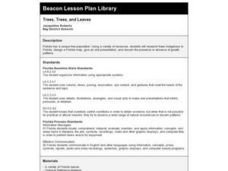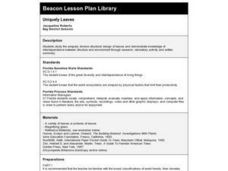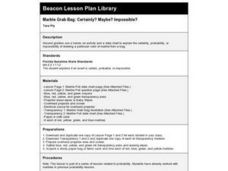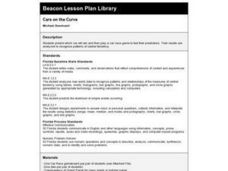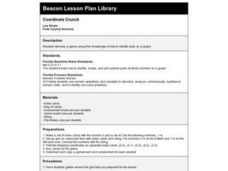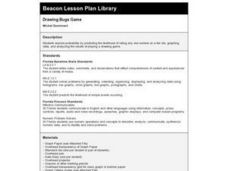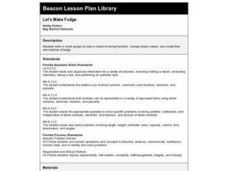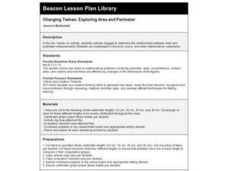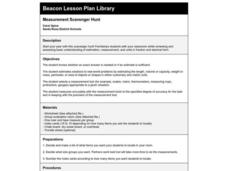Curated OER
My Crazy Contraption
Fourth graders design a contraption, which contains five different examples of simple machines and works without intervention. They sketch designs and label its parts. They present their creations to the class and relate them to Rube...
Curated OER
Metals or Nonmetals? The Families of Elements
Fourth graders, in groups, compile information on groups of elements. They study Alkali Metals, Alkaline Earth Metals, Halogens, and Noble Gases.
Curated OER
Making Tracks
Learners cast animal tracks on a field trip. They split up to capture tracks from different areas and use plaster of Paris to mold to the footprint. They bring casts back to class, create a negative mold and paint it black.
Curated OER
Trees, Trees, and Leaves
Young scholars research and examine trees indigenous to Florida. They develop a table/chart, draw leaves, design a map of Florida, and prepare and give oral presentations discussing the presence or absence of tree growth patterns.
Curated OER
Uniquely Leaves
Fourth graders study the uniquely diverse structural design of leaves and demonstrate knowledge of interdependence between structure and environment through research, laboratory activity and written summary.
Curated OER
Symmetry Monsters
Learners discuss and study the word symmetry. They examine letters of the alphabet, shapes, and artwork and decide if they are symmetrical or not. Then they create their own symmetry monsters.
Curated OER
Simply Symmetry
Learners are introduced to the concept of symmetry by examining different shapes and folding them into equal halves. They work in small groups focusing on finding the lines of symmetry of one specific shape. A symmetry booklet is made by...
Curated OER
Pizza Anyone?
Students, in groups, create models of pizzes and divide them, usin Unifix cubes, into fractions.
Curated OER
Names Count!
Second graders work in small groups to complete a graph and use data to determine range, mode, and median. They use the number of letters in their names and in fairy tale characters names to produce their data. This is a fun lesson!
Curated OER
Measuring Up on the Mayflower
Second graders use a meter tape to compare the length of the Mayflower to a basketball court and make homemade butter for crackers. Afterward, all students sit inside the makeshift Mayflower's dimensions and enjoy their Pilgrim butter.
Curated OER
Marble Grab Bag: Certainly? Maybe? Impossible?
Second graders use a hands-on activity and a data chart to explain the certainty, probability, or impossibility of drawing a particular color of marble from a bag. This activity comes with an excellent website, and many good worksheets...
Curated OER
Cars on the Curve
Second graders, using two dice, participate in a car race game called Cars on the Curve. They predict which car wins the game and records it in their Data Diary.
Curated OER
Coordinate Crunch
Learners identify plots on a graph while playing a game on a large coordinate grid and then on smaller grids.
Curated OER
Drawing Bugs Game
Second graders explore probability by playing a drawing game with dice. After they roll a die, they draw a tree diagram to illustrate each of the possible outcomes.
Curated OER
Geometry: Tessellations
Students create tessellations with computer software while applying their knowledge of reflections, rotations, and translations.
Curated OER
Let's Make Fudge
Students make fudge after reading fractional values in recipes and finding equivalent fractions to those presented in the recipes. They study measurement abbreviations.
Curated OER
Money Bags
Third graders explore different combinations of coins that can be used for specified amounts of money using paper money and tree diagrams. They write money amounts in different forms. Groups utilize a tree diagram imbedded in this lesson...
Curated OER
Perfectly Puzzling Pentominoes
Second graders utilize manipulatives (pentominoes) to demonstrate knowledge of: lines of symmetry, slides, reflections (flips), rotations (turns), area, and perimeter. This lesson plan gives students a meaningful way to practice these...
Curated OER
Water Bucket Relay
Third graders, in teams, play a subtraction game called Water Bucket Relay.
Curated OER
What Are The Odds?
Students read the book, Jim Ugly, and discuss whether the odds were in favor of or against the character Jake finding his dad. They demonstrate an experiment involving odds by keeping a tally of how many times a colored die is pulled out...
Curated OER
What to Do with Leftovers
Second graders solve real world division story problems using unifix cubes. They read "A Remainder of One" and discuss the concept of remainders. They solve the division problems first with the cubes and then write the problem and answer...
Curated OER
Changing Twines: Exploring Area and Perimeter
Third graders review formulas for area and perimeter in quadrilaterals. They arrange pre-cut twine on a centimeter graph paper to create non-congruent quadrilaterals. They calculate the perimeter and area of each form.
Curated OER
Measurement Scavenger Hunt
Students review estimation, measurement, fractions, decimals while familiarizing themselves with a new classroom at the beginning of the year.
Curated OER
Reaction Time
Third graders review important vocabulary to explain measures of central tendency and reaction time. In pairs, they measure reaction time of dropping and catching a ruler. Data is collected after repeated catches and information is...
Other popular searches
- Science Learning Centers
- Math Learning Centers
- Hands on Learning Centers
- Measurement Learning Centers
- Space Learning Centers
- Literacy Learning Centers
- Alphabet Learning Centers
- Ideas for Learning Centers
- Electricity Learning Centers
- Hand Math Learning Centers
- Easy Math Learning Centers
- Planet Learning Centers





